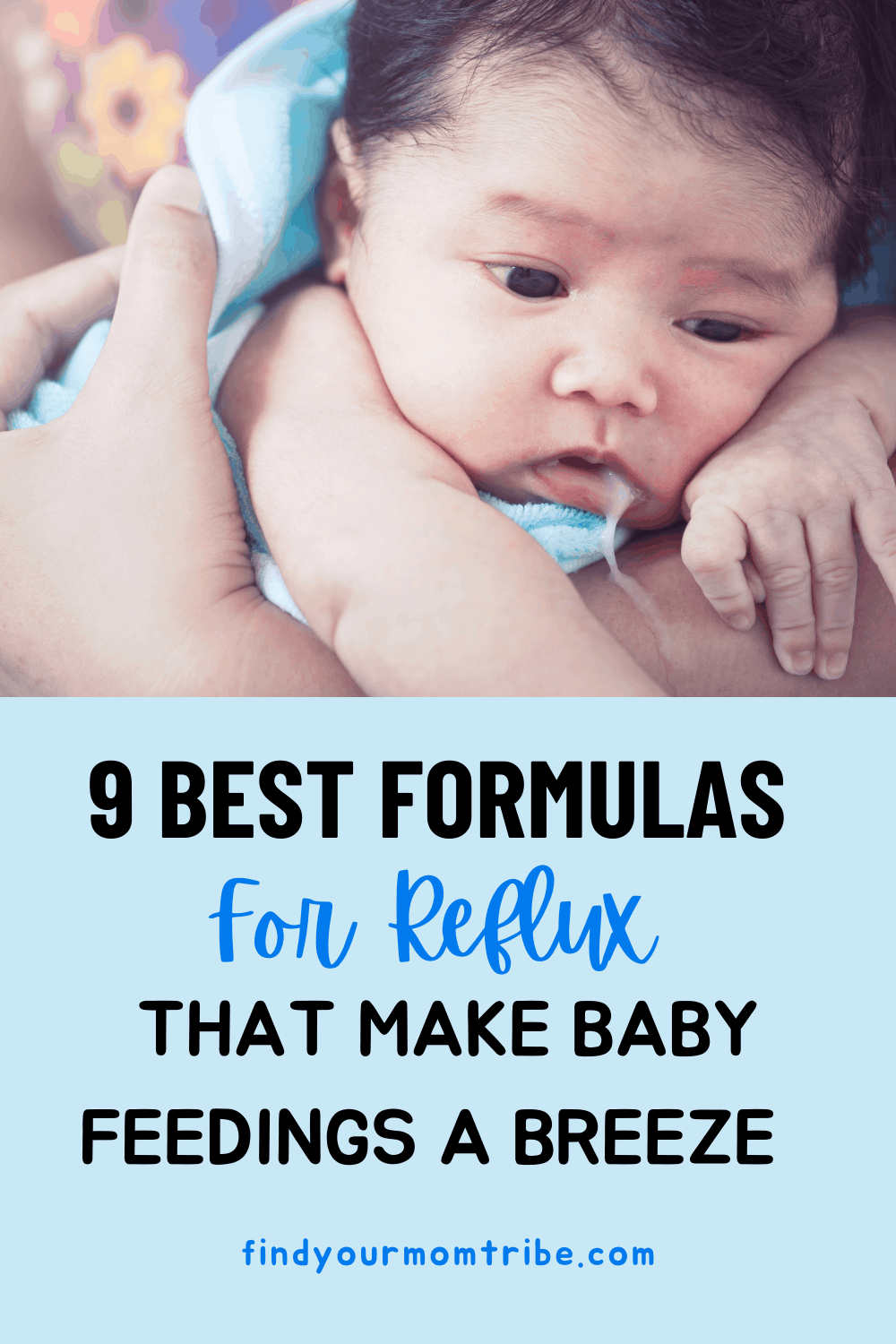One of the biggest hurdles of early parenthood is having a baby that suffers from acid reflux. If your baby is being formula-fed, you’re naturally wondering which is the best formula for reflux that will cause the least discomfort to your little one.
Babies with reflux not only have to endure lots of pain, but they also throw up regularly, causing them to not gain weight and in some cases, even lose weight.
As a result, feeding sessions, which should be a wonderful time, can turn into a struggle between mom and baby who can’t stand the sight of a bottle and starts crying as soon as they are laid down.
Luckily, the best formula for reflux does exist, and there is more than one available!
In fact, I’ve prepared 9 formulas to help you weigh the pros and cons of each before you decide.
Plus, I have plenty of helpful tips for you to try alongside the formula that will help your baby feel better, cry less, and make feedings the wonderful time they should be!
1. Enfamil A.R. Spit Up Baby Formula
- Emerging evidence from a recent clinical study showed MFGM in formula supports cognitive development similar to breast milk
- Get brain building nutrition inspired by breast milk from the formula brand thats #1 recommended by pediatricians
Prices pulled from the Amazon Product Advertising API on:
Product prices and availability are accurate as of the date/time indicated and are subject to change. Any price and availability information displayed on [relevant Amazon Site(s), as applicable] at the time of purchase will apply to the purchase of this product.
If you were to ask me, “Which formula is best for reflux?” then without a doubt, the answer would be the Enfamil A.R. formula.
It is also many parents’ first choice if their baby is struggling with reflux, and I definitely recommend it as the first formula to try.
Plus, it’s a much better option than adding rice cereal to a regular formula for one reason – it goes through the nipple of the bottle more easily.
One of the reasons why it’s the best formula for reflux is because it actually only becomes thick once it enters the baby’s tummy, so you don’t need to modify the nipples of your baby bottles in any way to allow the food to go through.
This formula also contains docosahexaenoic acid (DHA), which is an omega-3 fatty acid that your little one would have gotten from breast milk and is very important for a baby’s brain development.
In addition, it contains prebiotics (vitamin E and vitamin C) that help good bacteria grow in the baby’s digestive system.
RELATED: 6 Enfamil AR Side Effects And Things To Know Before Buying
2. Similac Pro-Total Comfort Infant Formula
- #1 BRAND FOR IMMUNE SUPPORT: Similac Pro-Advance is the first infant formula with 2’- FL HMO designed to be closer than over to breast milk. (IQVIA ProVoice Survey 12 months ending February 2020; Not from human milk)
- NO ARTIFICIAL GROWTH HORMONES: Similac is the first leading infant formula brand with no artificial growth hormones (No significant difference has been shown between milk derived from rbST-treated and non-rbST-treated cows)
Prices pulled from the Amazon Product Advertising API on:
Product prices and availability are accurate as of the date/time indicated and are subject to change. Any price and availability information displayed on [relevant Amazon Site(s), as applicable] at the time of purchase will apply to the purchase of this product.
Since Similac and Enfamil are some of the most popular formula brands in the US, it’s no surprise that this Similac baby formula is another one of the best formulas for reflux troubles!
For one, it contains partially hydrolyzed protein. If you’re not familiar with this term, hydrolyzed protein means that the formula will be easier for the baby to digest.
Mom’s milk, for example, is naturally easier for an infant’s stomach to handle, while cow’s milk is much heavier, so the proteins in the formula are hydrolyzed to be small enough for a baby’s gastrointestinal system.
What’s more, this formula also contains HMO (human milk oligosaccharide) that can be found in mother’s milk as well.
It’s a prebiotic that supports the good bacteria in the stomach and in the process improves the body’s defense system to harmful bacteria.
An antioxidant called lutein is also part of this formula and babies can usually only get it from breast milk.
Lutein is responsible for protecting our eyesight from degenerating and is also located in the baby’s brain.
I also really appreciate that this Similac formula is free from artificial growth hormones, so it’s a very healthy option for your developing baby.
3. PurAmino Hypoallergenic Baby Formula Powder for Severe Food Allergies
- Contains 1 14.1 ounce container of baby toddler Formula Powder
- Puramino is a hypoallergenic, iron fortified, and amino acid based baby and toddler Formula for the dietary management of infants and toddlers with severe cows milk protein and multiple food allergies
- Also suitable for conditions such as protein maldigestion, malabsorption/chronic diarrhea, short bowel Syndrome and eosinophilic esophagitis
Prices pulled from the Amazon Product Advertising API on:
Product prices and availability are accurate as of the date/time indicated and are subject to change. Any price and availability information displayed on [relevant Amazon Site(s), as applicable] at the time of purchase will apply to the purchase of this product.
It’s not rare for a baby that has trouble gaining weight and tends to be fussy as a result of feedings to have an underlying food allergy that needs a specialized formula.
Unfortunately, baby formulas that are made to be hypoallergenic tend to be higher up on the price scale, and this is definitely the case with PurAmino.
On the other hand, this formula was made for babies who are allergic to brands that use cow’s milk and is a great choice for those with really sensitive digestive systems for whom nothing else has worked.
It can be given to both infants and toddlers (until the age of 2), so it can support your little one’s nutrition for a long time without you needing to switch to other toddler formulas.
4. Enfamil Nutramigen Infant Formula
- Hypoallergenic ready-to-use infant formula —suitable for babies with lactose intolerance
- #1 Pediatrician Recommended Formula Brand for Cows Milk Allergy
- Fast relief NOW - Manage colic due to cow’s milk allergy as early as the first feeding, with 90% of infants improving within 48 hours
Prices pulled from the Amazon Product Advertising API on:
Product prices and availability are accurate as of the date/time indicated and are subject to change. Any price and availability information displayed on [relevant Amazon Site(s), as applicable] at the time of purchase will apply to the purchase of this product.
Formula that comes in bottles and doesn’t require any extra preparation or hassle is a convenient choice, especially for feeding sessions that take place in the middle of the night when you’ve just gotten out of bed.
Nutramigen by Enfamil was also made with sensitive babies in mind, even those who have allergies to the protein found in cow’s milk, which is what makes it the best formula for reflux.
In addition to DHA, it also contains arachidonic acid (ARA).
This fatty acid is very important for the healthy development of babies and can be found in breast milk, so its presence in baby formula is quite significant.
When it comes to how long it can be used to feed the baby, this formula is suitable for babies until the age of 1.
RELATED: Nutramigen Vs Alimentum: Which One Is Best For Your Little One?
5. Gerber Good Start Plant-Based Protein & Lactose-Free Non-GMO Powder Infant Formula
- LACTOSE FREE NUTRITION: Modeled after the complete nutrition & gentleness of breastmilk, this Plant Based Protein & Lactose Free formula is designed for babies who need non dairy milk solutions
- LACTOSE FREE FORMULA: This lactose free formula provides plant based protein along with Calcium & Vitamin D for strong bones & teeth & DHA for brain & eye development
Prices pulled from the Amazon Product Advertising API on:
Product prices and availability are accurate as of the date/time indicated and are subject to change. Any price and availability information displayed on [relevant Amazon Site(s), as applicable] at the time of purchase will apply to the purchase of this product.
If your little one just can’t stand lactose or the protein found in cow’s milk, and your doctor concludes that it’s the root cause of your baby’s fussiness, you can give soy formula a try.
The formula tastes almost like breast milk.
However, you should be aware that sometimes babies who are sensitive to cow’s milk also might not tolerate soy formulas very well, so keep an eye out for any signs that it’s not working well for your little one.
Apart from soy, this formula also comes with DHA that will help your baby grow into a healthy and happy tot.
And even though this is not a dairy product, this formula will still provide your baby with enough vitamin D and calcium to support the development of their bones.
6. Happy Baby Organic Stage 1 Infant Formula
- FOR SENSITIVE TUMMIES: Thoughtfully created for babies from 0 to 12 months with sensitive bellies, our Stage 1 Sensitive formula provides a complete nutrient blend with lactose reduced by 75% to ease occasional fussiness & gas in lactose-sensitive babies.
- WITH 4X MORE PREBIOTICS than most other organic infant formula, our formula delivers 2 prebiotics, GOS & FOS, fibers that mimic the function of prebiotics found naturally in breast milk, which promote healthy gut bacteria in infants.
Prices pulled from the Amazon Product Advertising API on:
Product prices and availability are accurate as of the date/time indicated and are subject to change. Any price and availability information displayed on [relevant Amazon Site(s), as applicable] at the time of purchase will apply to the purchase of this product.
If you would like to make your baby’s nutrition organic from day one, this formula by Happy Baby will definitely tick all the boxes for you.
It’s certified as organic by the US Department of Agriculture and it is also free from GMO.
As for what makes this a good choice for sensitive babies, this cow’s milk formula contains a much lower percentage of lactose than other brands, so it can be a good fit if your little one isn’t taking to lactose too well.
It comes with both ARA and DHA to aid in your baby’s development. Plus, it also contains calcium and vitamin D, in addition to iron.
Iron is especially important for babies, as it helps them grow, gain weight, and develop at a normal rate.
7. Gerber Good Start Soothe (HMO) Non-GMO Powder Infant Formula
- SOOTHING NUTRITION: Modeled after the complete nutrition & gentleness of breastmilk, this formula offers nutrition for babies up to 12 months experiencing colic, excessive crying, fussiness & gas
- PROBIOTIC FORMULA: Good Start Soothe formula features prebiotics, Comfort Proteins & probiotics that improve the good bacteria in tummies & promote soft stools; Its our closest formula to breastmilk
Prices pulled from the Amazon Product Advertising API on:
Product prices and availability are accurate as of the date/time indicated and are subject to change. Any price and availability information displayed on [relevant Amazon Site(s), as applicable] at the time of purchase will apply to the purchase of this product.
This edition of the Gerber Good Start formula is a great option for babies who spit up yellow and are generally very fussy and cry a lot.
While it is made from cow’s milk, the proteins inside the formula are made to be very easy for a baby to digest, so it shouldn’t cause tummy trouble.
You will notice that this formula contains Lactobacillus reuteri, a kind of probiotic that some experts believe could help fussy babies and reduce their crying and reflux (especially for babies with colic).
In addition, it contains DHA, as well as HMO, and is free from GMO.
8. Similac Advance Infant Formula
- Similac Advance Infant Formula is a nutritionally complete, milk-based formula for your babys first year with all ingredients carefully selected to meet our high standards
- NUTRIENTS: Features OptiGRO, our exclusive blend of DHA, Lutein and Vitamin E, special nutrients found in breast milk that are important for helping support babys brain and eye development
Prices pulled from the Amazon Product Advertising API on:
Product prices and availability are accurate as of the date/time indicated and are subject to change. Any price and availability information displayed on [relevant Amazon Site(s), as applicable] at the time of purchase will apply to the purchase of this product.
If you have been breastfeeding and are now looking to switch your baby to formula, the Similac Advance is a great option that doesn’t cause reflux for most babies.
Like the other reputable brands, it also contains DHA. There’s iron in it as well, along with vitamin E that is very beneficial to babies’ development.
This particular brand of formula will be perfect for babies from birth until 12 months of age, after which they can switch to a formula for toddlers.
9. Enfamil Gentlease Sensitive Baby Formula
- One 27.7oz can of Enfamil baby formula milk powder
- Clinically shown to ease fussiness, colic, baby gas, and crying in 24 hours with baby probiotics and easy to digest proteins that have been partially broken down
Prices pulled from the Amazon Product Advertising API on:
Product prices and availability are accurate as of the date/time indicated and are subject to change. Any price and availability information displayed on [relevant Amazon Site(s), as applicable] at the time of purchase will apply to the purchase of this product.
The Enfamil Gentlease definitely deserves a spot when it comes to the list of best formulas for reflux as it does a great job at helping babies with GERD (more on this later) keep their food down and reduce spit-up.
It’s a good choice for babies who are feeling gassy or generally colicky, considering that it contains proteins that are not too heavy on a baby’s stomach.
Plus, it comes with choline, another ingredient that’s very important for infants. When they are still in utero, the mom supplies the growing baby with choline.
After birth, babies need choline in their diet in order to grow and develop healthily.
Apart from choline, the Enfamil Gentlease formula also has iron and DHA, so you can rest assured that your baby will be getting all the necessary nutrients.
What Is Acid Reflux?

This is called regurgitation, and it’s a very common symptom of acid reflux in adults.
Unfortunately, infants aren’t immune to it either, and it can cause a lot of trouble for both parents and baby.
Also known as gastroesophageal reflux (GER), it causes babies to spit up their stomach contents. It is very common, especially with infants younger than 3 months.
The main cause behind reflux is the lower esophageal sphincter (LES), which acts as a barrier between the esophagus and the baby’s stomach.
Usually, it only allows food to enter the stomach from the esophagus and not the other way around, but if the LES isn’t strong enough, the food can go back up, causing the baby to start spitting up.
This happens to all infants to an extent and actually helps them get rid of the excess air that enters their tummy while they’re feeding.
But gastroesophageal reflux disease (GERD) is rarer and more difficult to navigate.
Luckily, it has many different symptoms that will help you and your pediatrician conclude that your baby has GERD.
For example, some of the telltale signs of GERD are lip-smacking, fussy behavior, spit-ups, or inadequate weight gain.
This is because they throw up so much that very little of the food stays down to help them grow and gain weight.
RELATED: Ranking The 11 Best Baby Scales To Track Babies’ Growth
Sometimes, babies find this so traumatic that they begin to refuse the bottle because they automatically associate it with the discomfort of throwing up.
The vomit will also appear different than usual – it can be yellow, blood-red, or green.
The baby can also have blood in their stool, while the stool itself can resemble coffee grounds.
Generally speaking, babies experiencing reflux symptoms can be very irritable and tend to cry more than other babies in their age group.
Since reflux can cause a baby’s lungs and airways to become inflamed and irritated, there are a number of breathing difficulties that can arise.
For instance, an infant with reflux can struggle with wheezing and coughing.
Unfortunately, not all babies with this disease have such obvious symptoms like vomiting. In fact, there are little ones who have something called silent reflux.
As the name suggests, babies with this type of reflux don’t throw up.
Instead, they swallow their stomach contents again, which causes even more pain because the acid travels through the esophagus twice.
And because the baby is seemingly managing to keep the food in their stomach down, parents usually don’t consider reflux to be the first thing that is wrong with their little one.
In fact, they might think that they’re just dealing with a fussy baby that cries a lot.
But even babies with silent reflux experience all the other symptoms associated with GERD, so it doesn’t take long for a medical professional to make a diagnosis.
A doctor will also be able to determine whether your baby has any allergies or can’t tolerate certain foods (such as cow’s milk protein) that could be the root cause of your baby’s problems.
Since many babies at this stage tend to suffer from colic, too, it’s important to rule it out as a possible culprit as well.
It’s also important to note that babies who breastfeed usually don’t suffer from GERD to the extent that babies who are fed formula do.
The reason lies in the fact that breast milk is much easier for young babies to digest, as opposed to formula.
So, if you can feed your little one breast milk, try to do so, but if this is not possible, it’s by no means the end of the world!
There are many options at your disposal to treat and minimize the symptoms of your baby’s reflux.
How To Treat Reflux

If you’re feeding your baby with formula, your best bet is to change to a different type that could be gentler on your baby’s tummy and easier to digest.
For example, soy milk formulas are a good choice, especially if your little one is lactose intolerant, and there are even brands that use goat’s milk instead of cow’s.
On the whole, though, the best formula for reflux is one that is specially made to have a thicker consistency than other brands.
As their texture is heavier than regular formulas, babies won’t be able to spit it up so easily.
You can also try sensitive formulas that were made for babies with allergies, as many parents have found them to be quite effective against infant reflux.
Unfortunately, these brands are usually less budget-friendly, so it’s a good idea to give them a try after the more thick formulas haven’t worked.
On the other hand, there are many parents who are hesitant to be switching formulas because they’re worried that might cause even more trouble for their little one.
In this case, you can try adding some rice cereal to thicken the formula yourself (after the go-ahead from your pediatrician, of course), even though this is not as convenient as a formula that does this on its own.
In addition to altering the formula, there are many other useful tips to help soothe your baby’s symptoms.
For example, don’t bounce the baby up and down in your arms right after he or she feeds, but hold them for 20 minutes or a half an hour in an upright position so that their food has time to settle in their belly.
Use this same upright position while your baby is taking their bottle, and avoid putting him in a position where he’s mostly resting on his back right after a bottle.
For example, if your baby needs a diaper change, it’s best to wait for half an hour and then do it.
And while we’re at the topic of diapers, try not to tighten it too much around your little one’s belly.
If it’s possible, try to shorten the feeding sessions but increase the number of times your baby feeds in a day, as a less full stomach might help prevent the baby from spitting up.
In more extreme cases, when the baby isn’t responding to any of these anti-reflux techniques and isn’t gaining weight, a doctor might prescribe medication, although this is quite rare and needs a lot of careful consideration.
What About A Baby Sleeping Wedge?

The fact that babies sleep on their backs and spend a lot of time lying down is one of the key reasons why they tend to suffer from reflux.
As they get older and begin to practice sitting up, the symptoms will gradually fade away until they disappear entirely.
Meanwhile, though, parents can get pretty desperate trying to find a solution that will work and bring relief to their baby as quickly as possible.
Unfortunately, not every single one of these solutions is the safest for young babies.
In just a few clicks, Amazon returns page upon page of results for sleeping wedges for babies that can apparently reduce reflux symptoms and help prevent the baby from choking on their own vomit in case they spit up while sleeping in their crib.
These sleeping wedges are usually placed inside the baby’s crib and lift the baby’s head while he or she is asleep.
But the American Academy of Pediatrics (AAP) advises against using any such wedge or bumper, as babies under the age of 1 should always sleep on their back on a firm surface to prevent Sudden Infant Death Syndrome (SIDS).
What’s more, according to the AAP, placing a baby to sleep on a wedge that elevates their head has not shown to help symptoms of GERD and can even be dangerous if the baby slides down into an improper sleeping position.
Also, you don’t have to worry about your little one accidentally choking on their own vomit while sleeping because the anatomy of the airways of young babies protects them against such a scenario.
So, while it may be tempting to purchase a baby sleeping wedge, remember that the risk of SIDS is very real and ultimately not worth it.
Sooner or later, your baby’s reflux will have disappeared, and waiting it out is the best and safest strategy for your little one.
To Wrap Up
Watching your baby suffer from acid reflux is incredibly difficult for every parent, but luckily, it’s a phase that doesn’t last forever.
Sooner than you think, your baby will finally be free from all the painful reflux symptoms!
In the meantime, picking the best formula for reflux for your little one should be at the top of your list, as it can significantly reduce episodes of spitting up and also help your baby gain weight adequately.
That being said, every baby is unique and what might be the best formula for reflux for one baby might not work for another, so it’s important to carefully analyze each.
Apart from changing the formula, it’s also important to follow the tips I shared above when it comes to easing symptoms of reflux and not making things any more difficult for your baby.
Even though this period could be incredibly difficult for you, take comfort in knowing that so many moms have been there and can now even laugh about it!
References:
“Inclined Sleepers and Other Baby Registry Items to Avoid”. Healthy Children, Dina DiMaggio, MD, FAAP. 2020, February 21.
READ NEXT: 14 Best Formulas For Gassy Babies To Put An End To Crying
Like this post? Please share or pin it for later. You can also stay in the loop and follow us on Facebook, Instagram and Pinterest.

We love honesty! Find Your Mom Tribe is an Amazon Associate and we earn from qualifying purchases through affiliate links at no extra cost to you. Please see our full Amazon Affiliate disclosure for more information.


